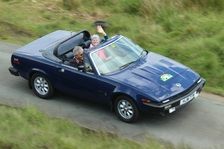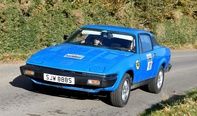Started the car to drive it out of the garage after working away as a key worker for many months. No movement on clutch pedal. Further pressure resulted in a noise which seemed to come from the bulkhead and then there was full and immediate movement but the pedal was sloppy. Nothing like it should be. Examination of the master cylinder reservoir revealed what appeared to be a very low but not depleted fluid level but the fluid that could be seen was dire. It was black. I was pretty certain the master cylinder was at fault so I ordered a repair kit. Having taken out the master cylinder there seemed no way I could get the piston out, it would slide freely and smoothly but would not vacate the bore. I cut my losses and ordered a replacement master cylinder which thanks to the excellent services of Robsport arrived the very next day. Within an hour of it arriving further idle manipulation of the old master cylinder resulted in the piston vacating the bore!!! I primed the new master cylinder as far as I was able before fitting but fully expected that the system would by now be full of air and that the spongy pedal would persist until I bled the system. This wasn't the case though, the pedal would only travel about one third of the normal travel and then would move no further. Slackening off the hydraulic pipe to the master cylinder resulted in fluid escaping as expected and I was able to press the pedal all the way down. Keeping the pedal in the down position and tightening the hydraulic pipe and then releasing the pedal resulted in the reservoir level dropping which I would expect, however the pedal would then again only travel about one third of the normal distance before coming to a stop. One answer would be that the slave cylinder has failed but given that there would be now be air in the system ( and in no way would I expect this to cause a hard pedal but I stand to be corrected) and that the problem with a hard pedal has only occurred after replacing the master cylinder this seems unlikely, hopefully. The other thing is that actually there didn't seem to be that much wrong with the old master cylinder, there was no obvious corrosion, pitting or scoring of the bores or piston and the seals seemed to be in remarkably good condition for the original items. There was some corrosion on the fork arm which wouldn't affect operation. I have to say I've never replaced a clutch master cylinder before, having driven more recently semi automatics, automatics or manuals with cable linkage but this seemed an easyish job for a novice like me (if fiddly, awkward and time consuming doing it in a confined space singlehandedly) so you will have to excuse me if I show my lack of knowledge.
An help and advice would be appreciated. supercass




